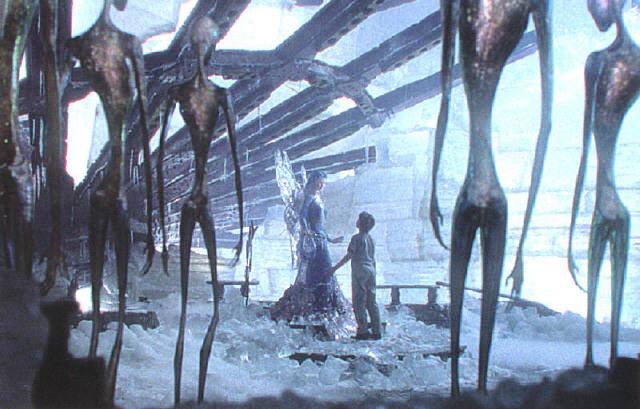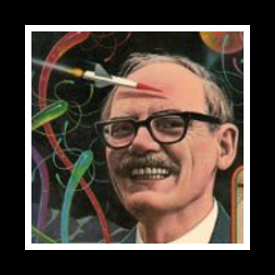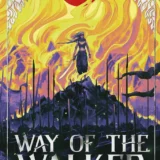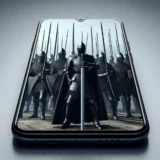 Three weeks ago I wrote about Steven Spielberg’s 2002 science fiction film, Minority Report. Since then Time Out has described the director’s previous film, A.I. Artificial Intelligence (hereafter known as A.I.), as one of the ‘100 Best Sci-Fi Films’ ever made – the 23rd best, to be precise. Two weeks ago I wrote about Time Out’s list here. So now what follows is a revised version of an article originally published about A.I. in Vector #222 (March 2002).
Three weeks ago I wrote about Steven Spielberg’s 2002 science fiction film, Minority Report. Since then Time Out has described the director’s previous film, A.I. Artificial Intelligence (hereafter known as A.I.), as one of the ‘100 Best Sci-Fi Films’ ever made – the 23rd best, to be precise. Two weeks ago I wrote about Time Out’s list here. So now what follows is a revised version of an article originally published about A.I. in Vector #222 (March 2002).
Stanley Kubrick films were always greeted with controversy, and even though he had been dead for over two years by the time his last movie, A.I., came out it proved no different. Of course A.I. was a collaborative project between the deceased Kubrick and the very much alive Steven Spielberg. For anyone who still doesn’t know, it is the story of a robot (Mecha) boy, David, programmed to love, but abandoned in the woods after a family misunderstanding, and who sets out on a quest for the Blue Fairy from Pinocchio, who he believes is real and who will make him human.
Kubrick famously worked on A.I. through the 1990s, variously frustrating writers such as Brian Aldiss, Ian Watson and Arthur C. Clarke. Aldiss provided the initial short story on which the film was based, ‘Supertoys Last All Summer Long’. Perhaps Kubrick was thinking that as a short story by one British SF writer, Clarke’s ‘The Sentinel’ (plus elements of other stories including ‘Breaking Strain’), eventually resulted in science fiction masterpiece 2001: A Space Odyssey (1968), starting with a story by another British SF veteran might lead to a similar outcome. Thus Aldiss worked on the screenplay, famously quoting Kubrick’s dictum that all one needs to make a film is ‘half a dozen non-submersible units’, before becoming frustrated by the director’s desire to turn the tale into an SF version of Pinocchio. Watson similarly worked on the project and left, after which Kubrick turned to Clarke.
When I interviewed Arthur C. Clarke in in April 2000 he told me, ‘Stanley went through a number of writers and eventually he sent me a fax for which many writers would have murdered their entire families, saying “Only you can write the script, name your figure.” Well that was a challenge I couldn’t resist and I did write an outline – really I did it because I owed him so much; I never got a penny for it, I never asked for anything. But I did a lot of work and developed a script that I thought was pretty good and my agent thought was the best thing I’ve ever done, but unfortunately Stanley hated it. But now Stanley’s brother-in-law, Jan Harlan was here filming me recently for a retrospective on Stanley, and Jan is with Steven now and he’s got a copy of my script, and I very much hope they can find it useful.’
There are certainly elements in the finished film which are reminiscent of Clarke, most notably the mystical, ice-locked coda, which evokes the 1949 story, ‘History Lesson’. However, it’s worth noting that Spielberg and Kubrick talked long and often by phone through the 80s and 90s, and Kubrick eventually asked Spielberg to take over A.I.. Meanwhile Spielberg already had a connection with Clarke, his company Dreamworks SKG basing Deep Impact (1997) in part on Clarke’s novel The Hammer of God. 
John Baxter’s biography Stanley Kubrick suggests Kubrick was jealous of the box-office success of Spielberg’s and Lucas’ SF and fantasy movies, and considering how those filmmakers publicly credited 2001: A Space Odyssey as laying the foundation for both Close Encounters of the Third Kind (1977) and Star Wars (1977), that he felt he deserved a popular hit on an equal scale. It appears A.I. was his attempt at that success. Though given the dark, serious, philosophical, action-free nature of the finished film, it was an odd attempt.
Where though did the Pinocchio factor come from? Many have pointed a finger at Spielberg, considered the more child-like, sentimental of the pair, yet it is clear Kubrick planned to work this theme into the film from an early stage. Spielberg had John Williams weave an orchestral version of the song ‘When You Wish Upon A Star’ from the 1940 Disney film of Pinocchio into the closing music of the Special Edition of Close Encounters of The Third Kind (1980), itself virtually Spielberg’s own reworking of 2001: A Space Odyssey. So perhaps it was all Kubrick’s little joke, taking something back from Spielberg’s blockbuster.
It has been observed that Spielberg directed A.I. in cool, detached style reminiscent of Kubrick, though thematically it is concerned with childhood lost, which is typical of Spielberg. There have always been lost children in Spielberg movies, from the abducted little boy in Close Encounters of the Third Kind (to say nothing of the boy eaten by the shark in Jaws (1975)) to the lost alien in E.T. (1982) to the English boy abroad in Empire of the Sun (1987), Peter Pan (and The Lost Boys) in Hook (1992) and the little girl in red walking through the holocaust in Schindler’s List (1994). There are the endangered children in the Jurassic Park (1993 & 1997) films, and the boy in Indiana Jones and The Temple of Doom (1984), all needing protective adults to care for them. The title A.I. deliberately echoes that of E.T. and the story of a lost robot boy wanting to find his mother clearly parallels a little lost alien child wanting to go home.
A.I. is a film in three acts. Once over the disappointment of Spielberg yet again shooting what should be a big film in the narrow screen ratio of 1.85-1, a form totally unsuitable for the epic vistas of visionary SF, the opening act is rather good. We meet the family which will adopt Mecha boy David, a marvellous performance by Haley Joel Osment, see David adjust to the family, come to love his human mother, then suffer the trauma of being abandoned in the woods, Hansel and Gretel style. Much of this is very effective and even a robot teddy bear sidekick proves to be a strong character, far removed from the sickly cuteness such a notion implies.One subtle touch, given what happens later, is that David’s first appearance is initially shown so extremely out of focus that he resembles the alien visitors as they emerge from the spaceship at the climax of Close Encounters.
The second act is much less successful, largely because plot elements are insufficiently developed, or are simply absurd. Once in the woods David almost immediately comes across a dumping ground for old robots, where other robots are scavenging for parts. This is most convenient as David has the chance to team up with Gigolo Joe, a sex robot well played by Jude Law. Other than that presumably he is programmed to do so, we never learn why Joe hurries from having sex for money with one woman after another. We would assume someone owns him, that he is working for either a human pimp or corporation, except that he appears to act independently. So perhaps he needs the money, but for what? We never find out and it leaves an intriguing character under-developed. Even his departure from the film is down played, though effectively, darkly comic.
It is further convenient in that our mechanical buddies, teddy and other robots are immediately hunted as potential participants in the local Flesh Fair – the hunters use a balloon for no other reason than it gives Spielberg an excuse to visually reference Close Encounters again, though on this occasion without purpose. A Flesh Fair, it turns out, is a carnival where humans who are opposed to the existence of robots go to enjoy the spectacle of Mecha being destroyed in inventively macabre ways.
Any argument about whether the presence of robots in human society is a good or bad thing is squashed as Spielberg stacks the deck by making the anti-lobby a pack of howling rednecks. Given that this is supposed to be 140 years in the future, its strange that popular music still consists of thrash metal, a form already dated a decade before A.I even hit cinemas. Still, world building isn’t A.I. strong suit; in one scene there is a photo on a shelf of William Hurt’s character – David’s designer – with a car which looks absolutely contemporary, circa 2001. The apartment David’s adoptive family inhabit is equally straight out of the year the film was released.

Later our heroes visit the futuristic version of an internet booth, which is a franchise of ‘Doctor Know’, a patronising, talking database no one would listen to for five seconds. The database is fronted by a hyperactive 3D animation seemingly styled on equal parts the Wizard of Oz, a cartoon Einstein and the Windows Office Assistant. It is as if computer communications have been entirely taken over by a nightmare merger between Microsoft and Disney. All this becomes increasingly tiresome, relieved only by some imaginatively designed shots of Rouge City (New York), which would be impressive if lensed wider.
The second act climaxes as David finds a range of robot boys identical to himself. We learn David’s designer lost his own son, so has a psychologically unconvincing plan to flood the world with replicas of his dead boy, thus providing himself with constant reminders of his grief. However one feels about this bizarre plan, the sequence leads to David finding a Coney Island replica of the Blue Fairy deep under the flooded remains of New York. It has been speculated Kubrick would have ended the film here, the robot boy praying to a plaster statue for eternity.
What is not explained, and makes no sense, is how and why people are still working in the partially flooded towers of Manhattan. We can only presume its because it looks cool. Though not as cool as when, at the opening of the third act, the towers are ice-bound. For the final act an appropriately millennial 2000 years have passed, and given that David is soon to be ‘resurrected’ (as was E.T.) more than passing significance can be read into this passage of time; the film is now as far from us in time into the future as we are from the Crucifixion. David is revived, not as many critics have written, by aliens, but by advanced Mecha. They do, unfortunately, look somewhat like a version of the aliens from Close Encounters, so it’s easy to see where the confusion may have crept in, as if Spielberg were attempting to link the two films. In-fact just as David searched for his mother, his creators and for the chance to be human, 2000 years from now Mecha archaeologists search for information about their long dead creators.

It has been written in various reviews that this final act spoils the film by degenerating into Spielbergian sentimentality. Against this I would argue that it was a relatively brave decision in mainstream filmmaking to suddenly shift the story two millennia to a time when humanity has died out and the world is frozen. It is also, not coincidentally, an inversion of the famous millennia-spanning cut from a desert pre-civilization earth to Man at his technological peak in 2001: A Space Odyssey. And Spielberg did manage to pull off the trick of releasing A.I. in that fabled year of 2001.
There is no sentimentality, only emotion, and the final half-hour makes the previous disappointing 80 minutes worth sitting through. What unfolds is quiet, genuine science fiction drama without recourse to action, violence or destruction, the film ending in the most calm, valedictory way possible. Spielberg for once asks the audience to use their imagination, to follow the story in a direction we are used to from many of the best SF novels – a change of perspective to a higher, alien, transformative scale – but which is almost entirely unfamiliar to multiplex cinema. And which may be the source of the bad reviews. Unfamiliarity. The final act of A.I. is closer to Clarke’s Childhood’s End or Greg Bear’s Blood Music than Close Encounters or E.T..
The film is greatly aided by the quietly majestic and elegantly modernist score by John Williams. Other than owning an inspiration to the minimalism of Philip Glass, Williams’ music sounds like nothing either he nor any other film composer has written before. In-fact in hindsight there is a good case to be made for A.I. representing John Williams’ last great score to date. It certainly works as a perfect fusion of these specific images with this very particular music, a world away from the purely functional, personality free and entirely interchangeable scores featured in almost all Hollywood SF features circa 2014.

In 2001 I wrote that A.I. was more successful as a fable that as pure SF, a film to be seen and argued over, which in the current climate of mindless special effects dominated action fodder made it easy to over-rate. Well, nothing has changed. Though the film was, artistically, something of a triumph, and at least half-way intelligent, it proved to be among Spielberg’s least commercially viable releases. He would follow it with the mediocre but more successful Minority Report. You can read me tearing that film to pieces here.
Back at the time of release I heard that some performances of A.I. were greeted with cat-calls and cynical jeering. In the 600 seat cinema in which I saw it the audience sat transfixed, spellbound through the otherworldly final 15 minutes. 13 years on A.I. remains a deeply flawed film made valuable by its extremely powerful last act and so stands as one of the best SF films of its year.
…is a freelance editor, writing consultant and story structure expert. To find out more, including hiring me to work on your writing project, read my profile or visit my website, To The Last Word.








